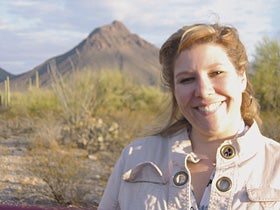Heather Pacheco ’98
The Art of Teaching Science
 Armed with a new degree in geology and geological oceanography from URI, Heather Pacheco set out on a three-month road trip across the country to see America’s natural wonders. She discovered the Grand Canyon, the hot springs of Wyoming, and the majestic Rocky Mountains. She also discovered that Americans had “a general lack of appreciation and understanding of the natural resources around them.” She decided to do something about that by becoming a science teacher.
Armed with a new degree in geology and geological oceanography from URI, Heather Pacheco set out on a three-month road trip across the country to see America’s natural wonders. She discovered the Grand Canyon, the hot springs of Wyoming, and the majestic Rocky Mountains. She also discovered that Americans had “a general lack of appreciation and understanding of the natural resources around them.” She decided to do something about that by becoming a science teacher.
Pacheco earned her master’s in education from the University of Massachusetts in Boston and began teaching earth sciences at Framingham (Mass.) High School. She strongly believes that science needs to be taught well because “we want to have a critically thinking community of citizens with a solid background in scientific concepts who can make well-informed decisions.”
In 2009, Pacheco received an Albert Einstein Distinguished Education Fellowship to work with the National Science Foundation in Virginia evaluating school science and technology programs for effective engagement with the K–12 science education community.
When the fellowship ended, Pacheco joined researchers from the Woods Hole Oceanographic Institute on a trans-Atlantic research expedition studying foraminifera fossils as a way to track climate change, an issue Pacheco believes is shaking Americans’ trust in the scientific community: “The American climate change ‘debate’ not only impacts the faith of Americans in the scientific community, but it also has negatively impacted the faith of Americans in their schools and teachers.”
Her goal is to bring new life to science education by focusing on quality interdisciplinary professional development for teachers. For Pacheco it is vital to have “a well educated and continually educated teacher workforce that sees students as whole people.” She wants science to empower teachers and students alike with the knowledge that “regardless of race, gender, socioeconomic status, or culture they can access information, form opinions, and have a voice in their own communities.”
Pacheco is currently pursuing a Ph.D. in science education at Arizona State University.
—Robin Deal
 Home
Home Browse
Browse Close
Close Events
Events Maps
Maps Email
Email Brightspace
Brightspace eCampus
eCampus


